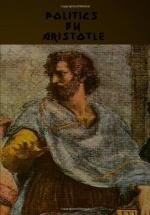
|
| Name: _________________________ | Period: ___________________ |
This test consists of 15 multiple choice questions and 5 short answer questions.
Multiple Choice Questions
1. Aristotle says that monarchies are purely what?
(a) Natural.
(b) Hierarchical.
(c) Matriarchal.
(d) Patriarchal.
2. Aristotle says that in order to receive the full load of privileges and obligations related to being a citizen, a person must what?
(a) Be educated.
(b) Live in one place.
(c) Have his parents be citizens.
(d) Be an adult.
3. Aristotle says that holding property in common, in communal status, leads to what?
(a) Cheating.
(b) Fighting.
(c) Neglect.
(d) Dishonor.
4. What does Aristotle think is the solution to crime?
(a) Jobs.
(b) Giving people property.
(c) Education.
(d) Taking part in ruling.
5. Aristotle says that slaves should only cultivate the virtue of what?
(a) Thinking.
(b) Acting for themselves.
(c) Obedience.
(d) Free speech.
6. Aristotle says that when people of wealth are cast into poverty, it is a breeding ground for what?
(a) Discontents.
(b) Revolutionaries.
(c) Murderers.
(d) Criminals.
7. What name does Aristotle give the class that are fighters and legislators?
(a) Promoters.
(b) Guides.
(c) Protectors.
(d) Guardians.
8. How many of the highest ranking officials do Plato and Aristotle thinks should be above the law?
(a) Three.
(b) None.
(c) Two.
(d) One.
9. The second introduction helps readers to what?
(a) Get ready to read Aristotle.
(b) Know how to interpret the book.
(c) Know the history of Ancient Greece.
(d) Understand Aristotle's life.
10. According to Aristotle, the end in a democracy is the best interests of whom?
(a) The middle class.
(b) The rich.
(c) The individual.
(d) The poor.
11. When Aristotle describes a "pair" in society, what is he describing?
(a) Any pair of citizens who contract together.
(b) Any two consenting adults.
(c) An adult man and woman.
(d) Any pair of people that work together.
12. Aristotle is opposed to rule by what?
(a) Factions.
(b) Inheritance.
(c) Groups.
(d) Merit.
13. Aristotle says that some oligarchies can progress to what?
(a) Monarchies.
(b) Polities.
(c) Democracies.
(d) Aristocracies.
14. Plato thought that the wives of the two highest social class should be what?
(a) In charge of ruling.
(b) Held in common.
(c) From the lower classes.
(d) Housed in the same facility.
15. The first known translation of "Politics" after Aristotle's death was into what language?
(a) Latin.
(b) German.
(c) French.
(d) Arabic.
Short Answer Questions
1. Aristotle compares a constitution to what?
2. What type of governing system used judges and juries, with no fees associated with the dispensation of justice?
3. The second introduction tells the reader that some of Aristotle's opinions might be met with what?
4. What is the greatest number of people Aristotle uses in the exercises in his book?
5. Aristotle thinks that the craftsman who tries to make laws will do what?
|
This section contains 431 words (approx. 2 pages at 300 words per page) |

|




